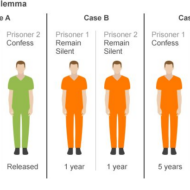Posted by Managementguru in Business Management, Marketing, Operations Management, Principles of Management, Strategy
on Mar 16th, 2014 | 0 comments

Game theory and strategy What is Game Theory: Set of concepts designed for decision making in situations of competition and conflict under specified rules. The prisoner’s dilemma: The prisoner’s dilemma is a canonical example of a game, analyzed in game theory that explains why two individuals might not cooperate, even if it appears that it is in their best interest to do so; Albert W. Tucker formalized the game with prison sentence payoffs and gave it the “prisoner’s dilemma” name. To solve many practical problems that are encountered in economic, military or other disciplines, one has to deal with situations in which there are two or more conflicting parties striving for the same objective and the outcome of each action of one party depends solely on the opposite parties choice of a course of action. As we all know only one horse can win the race ultimately and the other parties only can prolong the race or see to that they make every possible move to delay the opponent’s success. So, what’s this game theory all about? This is a special mathematical method that was evolved mainly to analyze conflict situations where the number of competitors is finite, each participant has a definite set of actions to choose and there is a conflict of interest between the competitors. So it helped the participants to reach a decision that would put them in the winning post. This theory has spilled its implications on business situations where success is the motto and conflict and competition the order of the day. Only the best among the best survive. Darwin’s theory, “Survival of the fittest” applies not only to biological organisms but also to business organizations which are also abuzz with activity. Chance Moves: Games like chess, checkers are played according to a definite set of rules laid down and these game patterns has inspired business persons to introduce strategies in business, where the concentration is mainly focused on the chance moves that defeats the opponent. Big business corporates mainly concentrate on the strengths and weaknesses of their competitors to have an edge over them. A real game is controlled and regulated by the statutory rules to be followed but a business game involves lot of killer instincts and intuitions combined with rational thinking and logic. Optimal Strategy: The first party always puts himself in the shoes of the other party and tries to perceive how the other party would react in a particular situation. Although the aim is to win, choosing the optimal strategy is what matters. It will at least keep you in bay. Precise solutions can be arrived at if you plan your game fittingly. The anticipation and thrill that is involved in a strategic game is matchless. We witness a lot of firms imitating what the leader of the market does. The risk is borne solely by the firm introducing the change and the firm takes the major share of profit as it is the pioneer and if it loses the next strategic move is planned for. For a company with sound financial position, the chance move is worth giving a try, head or tail doesn’t matter. The stalkers are benefited by the waiting period during which they come to know of the pros and cons of the strategy employed by the leader. Games are played in the true spirit of sportsmanship, but a business faces cut throat competition. There is no space for any courtesy or liberal approach. If you are quick enough to pick the pulse of the people by gauging their preferences, analyzing the market conditions and employing timely strategies you will at...


